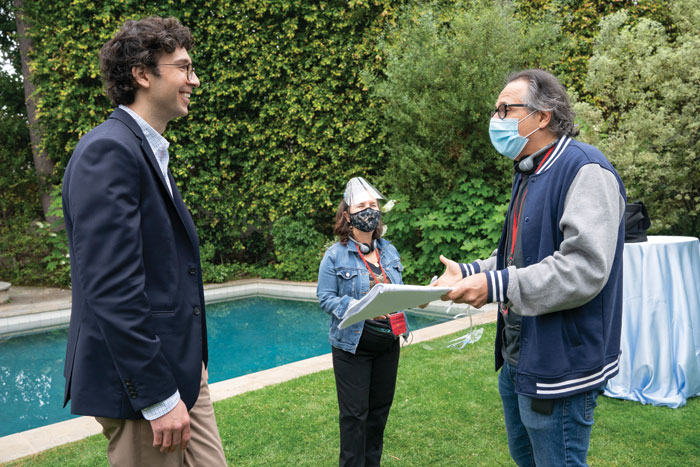 “As We See It” star Rick Glassman (left), on-set advocate Elaine Hall and series creator Jason Katims. Ali Goldstein/ Amazon Prime Video
“As We See It” star Rick Glassman (left), on-set advocate Elaine Hall and series creator Jason Katims. Ali Goldstein/ Amazon Prime Video “As We See It,” the Amazon Prime series that debuted on January 21, is a vivid statement of what’s possible when you create art in an inclusive atmosphere. Rick Glassman, Sue Ann Pien and Albert Rutecki play 20-something roommates on the autism spectrum who are trying to find their independence and their place in the world. Neurodiverse actors play the show’s leads; plus, there are neurodiverse supporting actors, background players and production assistants.
“The show seriously personifies what [February’s] Jewish Disability Awareness, Acceptance and Inclusion Month (JDAAIM) is all about,” Elaine Hall, the show’s access coordinator and on-set advocate, told the Journal. “One of the greatest mitzvahs you can do is give someone a job. And 80% of people on the spectrum are unemployed or they’re underemployed. So let’s not only give them a job. Let’s show the world what’s possible.”
A pioneer in creating neurodiverse experiences and opportunities, Hall is the founder and artistic director of The Miracle Project, a fully inclusive theater, film, social skills and expressive arts programs for individuals with autism and all abilities. Many of The Miracle Project’s participants appear on “As We See It.”
Years ago, Hall realized she could communicate with her non-speaking autistic son through creative play. The Miracle Project, among other books and projects, grew out of those efforts. She has worked with TV and film writers, directors, actors and production companies to help assure their content authentically portrays individuals of all abilities and disabilities. “As We See It” brings next-level awareness and inclusion of people of all abilities.
“Let’s not only give them a job. Let’s show the world what’s possible.” – Elaine Hall
In the summer of 2019, “As We See It” creator Jason Katims, perhaps best known for “Friday Night Lights” and “Parenthood,” called Hall to see if she’d like to be their on-set advocate. They filmed the pilot that fall. It was very well-received, and the show was greenlit in early 2020. Then, after a COVID-forced break, they got the go-ahead to proceed in early 2021.
“I just really got to be myself and use all the same principles that I’ve created for The Miracle Project, which is creating a loving, nurturing, supportive environment,” Hall, who identifies as neurodiverse for her sensory sensitivities and different way of thinking, said. “What we focus on is the ability within the seemingly disability of being on the spectrum, looking at what a person can do, rather than what they can’t do.”
At first, there was a question about whether neurodiverse individuals would be okay on set all day. Would there be tantrums? Would they be hard to work with? Hall said the opposite is true. The real world is the challenge.
“Being on a set is our happy place,” she said. “Everything makes sense. Everybody has a role. We know what is expected of them. It’s a very predictable environment. And also, it’s a place where we get to really be creative and be ourselves and use our strengths.”
But it’s even more than that. Hall said she and the creator of JDAAIM, Shelly Christensen, have changed from using the term “inclusion” to “belonging.”
“It’s not about being included in something,” she said. “I don’t want to be included in my synagogue, I want to belong to my synagogue. One of the most important things that we, as Jewish creators, innovators and employers, need to start remembering is that we all have an essential need to belong. The show really brings all of this to the forefront.”
Hall has nothing but praise for the team behind and in front of the camera.
“[Sue Ann, Rick and Albert] brought their authentic selves to the material,” Hall said. “And the material was so brilliantly written that [it] allowed them to effortlessly draw on their own past experiences and bring it to the roles.”
Hall lives in Santa Monica with her husband, Jeff Frymer. Her son, Neal Katz, lives independently with support and uses his iPad as a communication device. Hall and Katz have presented on neurodiversity multiple times to the United Nations.
“My dream is to change the way the world perceives ability and disability,” Hall said. “My driving force is to make this world a place where my son, all my students and all the actors I meet [can thrive].”
She continued, “If ‘As We See It’ can open doors to more appreciation, acceptance and curiosity, then we [have] really done our job.”























 More news and opinions than at a Shabbat dinner, right in your inbox.
More news and opinions than at a Shabbat dinner, right in your inbox.